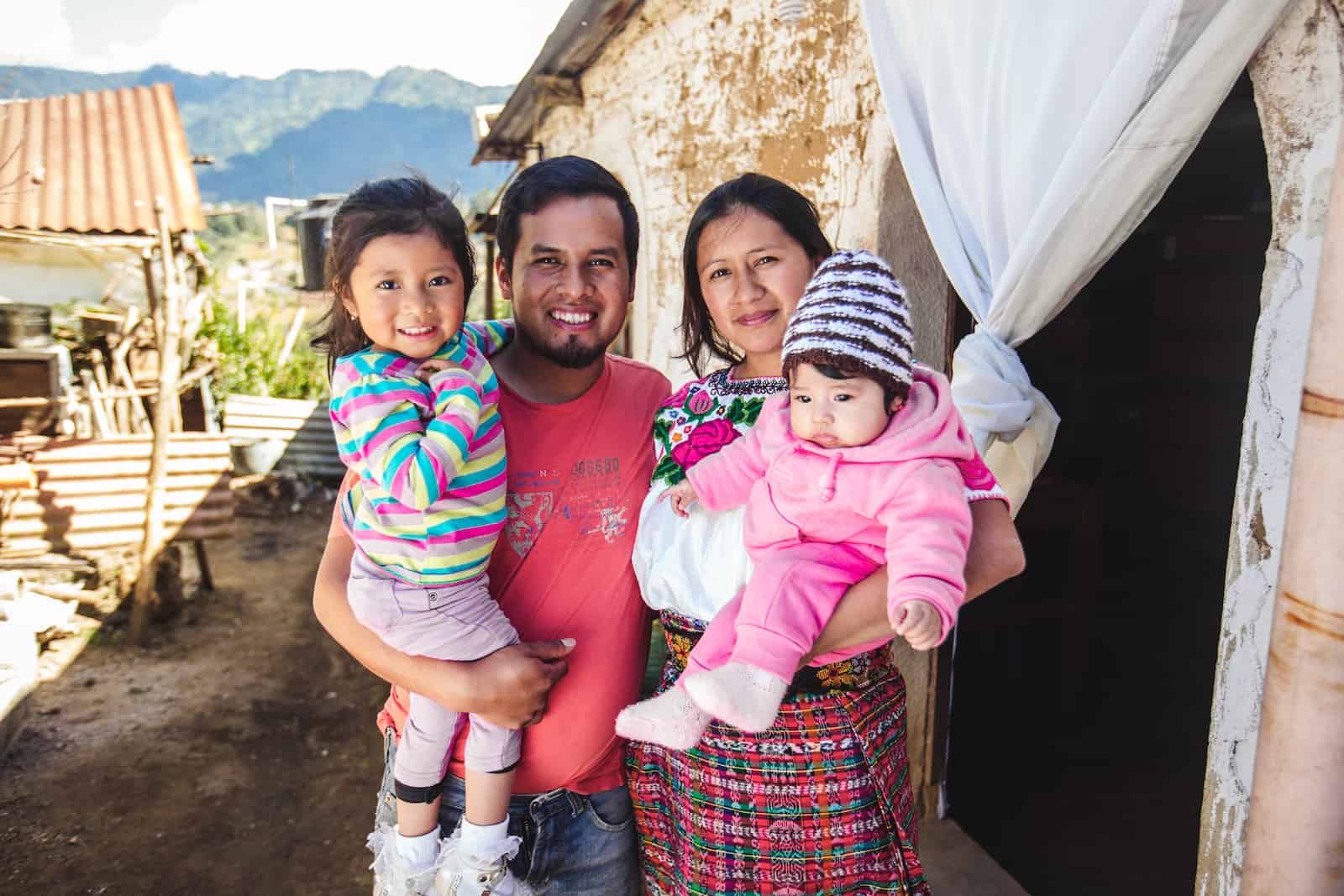Cognitive dissonance is a theory in social psychology for how we experience dissonance, or inconsistency, and respond to it. A simple definition of cognitive dissonance theory states that individuals experience feelings of discomfort when encountering two or more conflicting beliefs, behaviors or attitudes. We find ways to reduce dissonance through behavioral or attitude changes. One example of cognitive dissonance theory is how Americans, many of whom live in relative wealth, react when confronted with extreme poverty.
This guest post is by Suellen Wenz, a former editor at Compassion International. She wrote a graduate research paper about a cognitive dissonance theory example that is near to our hearts: wealth and poverty. We asked if we could turn her paper into a blog article.
We’ve “de-academicized” it a bit so that you can better understand cognitive dissonance theory … and what it has to do with wealth and poverty.

The issue of the relative wealth of Western Christians contrasted with the desperate poverty among citizens of developing countries is compelling. As an editor at Compassion, I regularly see individual stories of extreme poverty and its effects — stories repeated in the lives of millions of children around the world.
More than 15,000 children under age of 5 die every day, mostly from preventable causes; nearly a billion people live in extreme poverty, on $1.90 a day. These statistics are almost too vast to comprehend. So how do we, who live comfortably in wealthy America and other Western nations, confront the extreme poverty of our brothers and sisters in poor countries around the world?
What do we do when faced with this reality, especially as Christians who hold to Christ’s teaching about caring for the poor?
Should it and does it bother us at all?
Why do we have all that we have, and why don’t they have anything? Are we conflicted over this?
Cognitive Dissonance Theory and the Economic Divide
As humans we like consistency. We are uncomfortable holding to contradictory beliefs and actions, and will try to minimize our discomfort, creating a balance between our thoughts and our actions. This is cognitive dissonance theory, an intrapersonal communication theory developed years ago by Leon Festinger, a psychologist from the United States.
According to this theory, an event or situation that produces conflict between our attitudes and our behaviors creates a tension that must be resolved — either by altering our beliefs or by altering our behaviors.
Dissonance is nearly unavoidable; we deal with it constantly to some degree or in some form. The more important a belief and/or action is relative to new, conflicting information, the greater the possible dissonance and the greater the need to resolve it.
The issue of magnitude is particularly important when it comes to wealth versus poverty.
Many Christians in America can be considered wealthy in global terms, and we often place high value on our lifestyles. We often feel our wealth is a God-given right or a gift from God, yet we simultaneously profess to hold to the biblical teaching about caring for the poor:
“Defend the cause of the weak and fatherless; maintain the rights of the poor and oppressed. Rescue the weak and needy.” – Psalm 82:3-4, NIV
The wealth and lifestyle issue is highly important to many, and causes dissonance among Christians who actually come face-to-face with the reality of world poverty. We must decide how we will respond to poverty in light of our own relative wealth and power. A higher level of attachment to wealth, plus a belief in biblical principles, plus personal exposure to world poverty, can force us into dissonance.
The existence of dissonance in everyday life and the need to create consistency once we experience cognitive dissonance, represent only half the picture, however.
An individual experiencing cognitive dissonance must determine to act before dissonance can be reduced. Recognizing and experiencing dissonance alone are not enough to reduce the feeling; we must make a decision and act upon it.
This need to act to reduce cognitive dissonance may be the sticking point when it comes to Western Christians encountering true poverty. The issue raises such questions as:
- How much is enough to give? Do I give all?
- What should I do because I can help only so many people?
As Christians we may be frustrated about what we are called to do and experience guilt over our privileged status living in Western culture.
Cognitive Dissonance Theory and Christian Worldview
Festinger’s theory of cognitive dissonance seems to dovetail well with Christian principles. If Christians are people of conscience with tender hearts, then encountering a reality that opposes biblical principles should bring action.
Christians should not be happy living in wealth and doing nothing about those in poverty. Such knowledge should produce dissonance. The extent of the Christian response varies greatly, however. Some Christians do “sell all,” while others take a more moderate approach. Obviously there is no one right way — it’s an individual response to God’s leading.
I’m wondering, though, if postmodernism is the death knell for, or at least a blow to, cognitive dissonance theory. After all, if there is no absolute truth (the cornerstone of postmodernism), then should holding two beliefs that seem to be in conflict be a problem for the postmodernist?
If there is such a thing as a postmodern Christian, will he or she be bothered by the whole issue of wealth relative to extreme poverty?
Maybe those two realities can peacefully coexist in the Christian mind. I hope not.
Thank you, Suellen, for helping us define cognitive dissonance theory and understand how it should move us toward action and compassion. Independent, peer-reviewed research has shown that Compassion’s approach to releasing children from poverty works. Read the research, and then learn more about our programs that are changing lives around the world!

This article was originally published Jan 16, 2009. We have updated the global poverty statistics.







12 Comments |Add a comment
Really appreciate this article !!!
Hi, I am currently studying the effects of short-term mission trips on children who are part of the team as part of an MA. I would love to read the original paper. Is there any way I can get hold of it?
Sure thing. I’ve sent it to you by email.
I am a child of Band-Aid and Live Aid. I was a junior in high school when “Do They Know It’s Christmas?” was released. And I remember seeing the CARE and UNICEF commercials as a child and feeling so sorry for these children, and wishing I could do something. So I’ve been aware of the poverty disparity for most of my life.
That’s why I sponsor a child. This has been a lifelong goal for me and I finally am in a financial position to do it. It is my prayer I can sponsor my child until she graduates from the program.
Jesus said, “The poor you will always have with you,” so we’d for sure better not ever get too comfortable with the dissonance discussed in this excellent article. This dissonance had better always be an underlying tension in our lives. It covers poverty overseas and poverty at home.
In the United States, our spiritual poverty is becoming as abject as the material poverty in Third World countries. A Gospel of a suffering Christ is not attractive to most unsaved people, but for those of us who have been walking the Walk for many years, it’s something we need to get more in tune with. It’s a deeper commitment spiritually. It in no way negates the victory of the Risen Christ, which is the central point, but it forces us to see suffering in the world and to be moved to help alleviate it as God leads us to do.
This is exactly what I experienced just last week. I was on a glorious cruise with my wife celebrating our 5th wedding anniversary and as we wandered off the beaten path we saw the depths of poverty on some of the islands in the Caribbean. (See I just did it…justifying the cruise by mentioning the anniversary to soothe my guilt about spending that kind of money on myself instead of giving it to the poor)
The people around our dinner table on the ship were experiencing the same thing. When one of them expressed shock over seeing the small shanties people lived in, my ears perked up. I responded that most Americans have no idea that a large portion of the world’s population live in abject poverty. One of the women at the table said she wished she could have helped them in some way. As an Advocate for Compassion International you can guess what my response was.
Luke 16:19 shows us that there is nothing wrong with having wealth. The sin of the rich man was is not caring for the poor. James 1:27 reveals that God finds it totally unacceptable for a Christian to ignore those in need. We can not have faith in Jesus Christ and then refuse to respond as he would. As James 2:17 tells us, faith without action is no faith at all.
I try to adhere to a Luke 6:30 theology, that is, “give to everyone who asks of you,” and I only share it [here] because the common response is typically, “How can I possibly give to everyone who asks?”
The truth be told, we don’t get asked as often as we say we get asked. If you are one who seriously believes that they are petitioned a ‘million-times-a-day’ then you likely need a new accountant. Do yourself a favor and actually tally how many times–in one week–a stranger asks you for something out of the ordinary. You might be mildly surprised to learn that you are an exaggerator.
Back to the Bible passage. Did you notice that God in His infinite wisdom has provided a loop-hole? God doesn’t give a lot of loop-holes, so you might want to pay attention to this one. While it is true that God says we are to give to everyone who asks, He does not say that we have to give them what they ask for!
Now we can look at that in two ways: we can slap a ‘high-five’ on the homeless guy every time he asks for a quarter, or as a Christian, we can ask for discernment from God as to what the appropriate thing is to give. God might say give him a quarter, or He might say give Him a twenty; He might say buy Him lunch, or He might say sit and talk with him; or He might just say offer up a prayer on his behalf.
Never as Christians have we been authorized to walk away or change the channel without giving something. We might not like it, but our personal feelings do not negate the truth.
Great article! I’d never looked at things this way before.
Geri
Hmm… nice point Chad.
I love this article. Very well written and very eye opening!
A postmodern statement: “There is no absolute truth.”
Postmodernists are making this very statement an absolute truth. Contradiction? You bet.
We can be so sheltered here in the western world if we choose. No look, no see, no know. But once we have looked, seen, known it really can’t be undone. What to do and how much? We DO have so much. DOES it bother us? ARE we conflicted? I hope so.
Very interesting! I had not thought of it in these terms before — especially related to poverty/wealth. Thanks so much for sharing this with us (and for “de-academecizing” it!).
Suellen has certainly described the experience of a sponsor who goes to visit his or her sponsored child, and of Christians who make short-term missions trips to poverty-stricken areas.
I certainly don’t mean to be simplistic, when I say that the degree of response is going to depend, at least in part, on how great one’s personal wealth is. Have I been given one talent? Five? Ten?
That does not solve the problem of whether to give all, or a part–and if only a part, how big is a “part”?
And how does this relate to God’s mandate concerning a tithe?